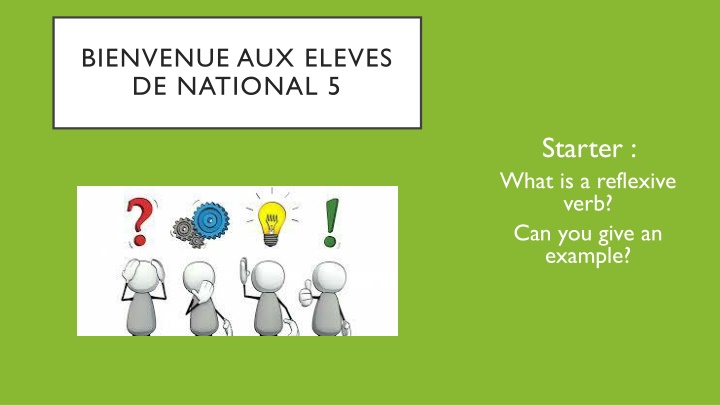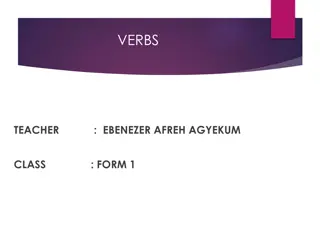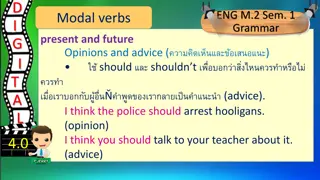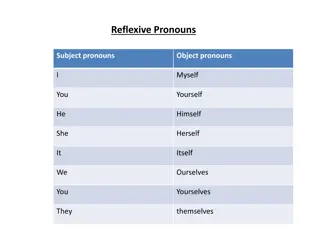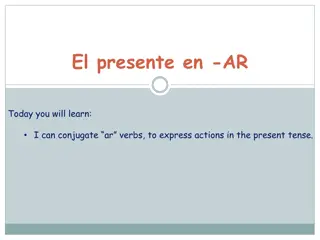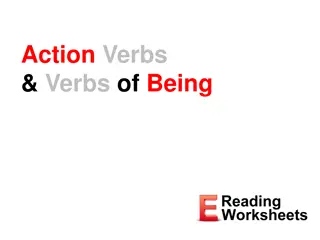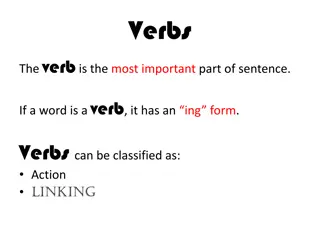Reflexive Verbs in French Grammar
Understanding reflexive verbs is crucial in French grammar. Learn what they are and how to use them with examples provided in this comprehensive study guide. Explore various reflexive verbs like s'entendre (to get on well), se disputer (to argue), and more. Practice forming sentences and understanding their usage in context through engaging activities and listening exercises. Improve your language skills and fluency in French with this resource.
Download Presentation

Please find below an Image/Link to download the presentation.
The content on the website is provided AS IS for your information and personal use only. It may not be sold, licensed, or shared on other websites without obtaining consent from the author.If you encounter any issues during the download, it is possible that the publisher has removed the file from their server.
You are allowed to download the files provided on this website for personal or commercial use, subject to the condition that they are used lawfully. All files are the property of their respective owners.
The content on the website is provided AS IS for your information and personal use only. It may not be sold, licensed, or shared on other websites without obtaining consent from the author.
E N D
Presentation Transcript
BIENVENUE AUX ELEVES DE NATIONAL 5 Starter : What is a reflexive verb? Can you give an example?
Grammaire Se disputer + je Je me Je me dispute
Grammaire S entendre + nous Nous nous Nous nous entendons
Grammaire Se disputer + vous
Grammaire S entendre + elle
Grammaire Se disputer + nous
MAKE A NOTE OF A FEW REFLEXIVE VERBS YOU WILL NEED FOR THIS UNIT. 1. S entendre = to get on well 2. Se disputer = to argue 3. Se confier = to confide 4. S amuser= to have fun 5. S occuper de= to look after 6. Se moquer de= to make fun of 7. S ennuyer= to get bored 8. Se chamailler = to quarrel Choose at least 3 verbs and put them into a short sentence in French
LIRE . TU TENTENDS BIEN AVEC TES PARENTS? Read these six sentences and make notes in English. Who do they get on or argue with? Why? 1. Je me dispute avec mon p re parce qu il est trop s v re. 2. Je m entends bien avec ma m re parce que je me confie elle et elle me laisse faire ce que je veux. 3. Je ne m entends pas avec ma petite soeur parce qu ellen aide pas la maison et elle se moque de moi. 4. Je me dispute avec mon grand fr re parce qu il ne s occupe pas de notre petit fr re. 5. Je m entends bien avec mon petit fr re parce qu on joue ensemble. 6. Je ne m entends pas bien avec ma grande soeur parce qu elle me critique toujours.
COUTER 2: TU TENTENDS BIEN AVEC TES PARENTS? Listen to 4 French teenagers talking about how they get on with their parents and make notes in English: 1. DENIS 2. MANON 3. AM LIE 4. ANNE-MARIE UNIT 1 ECOUTER 2.wma
GROUP READING CHALLENGE Write down all the new words on labels for your box!
READING SKILLS AT N5 Always check the numbers of marks the question is worth Always read the questions and SCAN the text for keys words. Always check the ADVERBS near the key words. Always go to the END of sentence or until you reach a punctuation mark or a linking word. Make sure your answer makes sense in English.
SHORT READING TASK Je m entends bien avec ma demi-s ur L a, parce qu elle m aide faire mes devoirs. Elle est tr s intelligente et elle est assez compr hensive. Je m entends bien avec mon demi-fr re Victor parce qu il est rigolo et il me laisse jouer avec son ordinateur ou couter sa musique. On s int resse aux m mes choses. Je me dispute souvent avec mon petit fr re Yannick parce qu il est vraiment emb tant. a m nerve quand il vient dans ma chambre quand j ai des amis et il veut jouer avec nous. Je me chamaille avec ma petite s ur Sara aussi , parce qu elle est trop g t e par mes parents. Avec mon parents, ca va, mais mon p re est un peu strict. Il m emp che de regarder la t l . Je suis plus proche de ma m re parce qu elle est toujours l coute et je peux me confier elle et si je fais la vaisselle de temps en temps elle me laisse sortir avec mes copains mais seulement quand mon p re n est pas l !
QUESTIONS 1.Why does she get on with Lea? ( 3) 2.State two things that proves he gets on with Victor? (2) 3.What does Yannick do that gets on his nerve ? ( 1) 4.What does he think of Sara? (1) 5.What does he dad does not allow him to do ? (1) 6.Why is he closer to his mum? (2) 7.When he is allowed to go out with his friends? (2)
LISTENING SKILLS AT N5 Always check the numbers of marks the question is worth Always listen out for the ADVERBS near the key words. Always read the questions and predict your CUES. Make sure your answer makes sense in English. Take notes as you go even if they don t make sense.
THIS IS LANGUAGES https://www.thisislanguage.com/index.php/school/watch/watchvideo/211
QUESTIONS 1.Why does he get on with his family? (1) 2.What do they do when they have problems? (1) 3.Why is he close to his brother? ( 3) 4. Why does he think he is lucky? (1) In pairs, write down the CUES you would be looking for each question on a piece of paper. ( one each) When you hear the cue, grab the piece of paper.
